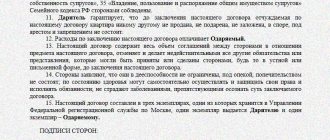A deed of gift with an encumbrance is sometimes the only possible way to obtain ownership of the desired real estate. It means that the apartment has certain restrictions on use. But there are many difficulties in receiving and donating such complex property. Before deciding to accept it, you should understand the essence of encumbrances and their main types. It will be useful to understand all the subtleties for those who want to give a “complex” apartment as a gift.
What is a deed of gift with an encumbrance on an apartment - concept
A gift agreement with an encumbrance is a donation of an apartment in relation to which there are claims of other persons or organizations.
Despite its existence, the owner has the opportunity to dispose of the property at his own discretion only with certain restrictions. It must be taken into account that disputes often arise regarding such apartments.
In some cases, a deed of gift may be considered void.
Terms of the transaction
In order for the transaction of receiving and donating an encumbered apartment to be legal, the following conditions must be met when concluding an agreement: 1. The donor has the right to dispose of such property, that is, to be its legal owner. 2. The recipient agreed to familiarize himself with all information on the property. 3. Compliance with all legal norms when drawing up a deed of gift.
IMPORTANT! Real estate with restrictions is not the most desirable gift, but if the recipient decides to draw up a contract, it is better to contact a qualified lawyer and draw up the document with his participation.
Legislative side of the issue
According to Art. 572 of the Civil Code of the Russian Federation, the owner has the opportunity to dispose of property despite the claims of third parties or organizations. But this does not mean that these claims will end with a change of owner.
The following mandatory conditions must be met to conclude a transaction:
- The apartment must be owned.
- The participants in the transaction must be sane.
- The recipient must agree to receive the apartment.
- The gift agreement must be drawn up correctly.
If you are offered to transfer an apartment by deed of gift, you must agree on all the conditions in advance. In difficult cases, the contract should be certified by a notary.
What is not consideration?
The gratuitous nature of the gift agreement excludes reciprocal provision on the part of the recipient. And yet the donor is allowed to make certain demands on him .
The Civil Code of the Russian Federation has not established what exactly should be considered a consideration. In the event of a dispute, the issue of hidden compensation in each case is resolved by the court based on an analysis of the case materials.
For your information
Judicial practice has taken the path of recognizing as reciprocal provision actions that clearly benefit the donor. If the donor does not get rid of all rights to the property (for example, reserves the right to partially use it), we cannot talk about a counter-grant.
The concept of “counter” implies that the benefit must be received personally by the donor. If a gift agreement stipulates conditions in favor of third parties (for example, establishing an easement for passage through a land plot in favor of neighbors or performing socially useful actions), the donor’s motives cannot be considered mercantile, and the principle of gratuitousness cannot be considered violated.
A symbolic payment for the gift provided, which is made in accordance with national traditions, cannot a counter-provision If the recipient “paid for” a donated house/apartment with a talisman or a ritual loaf, this cannot be payment.
Risks and possible consequences
The main risk is recognition of the transaction as void. Not only the donor, but also any interested person can file a corresponding claim in court. It is enough to provide evidence that the transaction is not in fact free of charge. If there is an encumbrance, it will not be difficult to prove this.
It is risky to enter into a gift agreement for an apartment that is under arrest. On the one hand, this fact does not deprive the owner of his rights. But in this case, the law prohibits the transfer of real estate to another person.
If the apartment is under arrest, you must first pay off the debt and then make transactions with it.
An ambiguous situation arises in the case of a mortgage encumbrance. The bank's approval is required to complete the agreement. Typically, the bank will require full repayment of the loan before transferring the property. If the bank allows a change of owner, a loan agreement for the remaining amount of debt is concluded with the new owner. He will have to pay the mortgage.
The transaction may be interfered with by the guardianship authorities. This can happen if one of the owners is a minor or incapacitated. The same applies to persons registered in the apartment. In this case, permission from the guardianship and trusteeship authority is attached to the agreement. It is necessary to convince the specialist that the defenseless citizen will not have his rights infringed.
Note! When receiving real estate under a gift agreement, you must pay income tax in the amount of 13% of the transaction value. The only exceptions are close relatives.
Package of documents and procedure for their execution
To sign a deed of gift with an encumbrance, the following documents are required:
- Passports or other identification documents of both parties.
- If the gift is given to a minor, then a birth certificate.
- Real estate documents. Most often, this is a state registration certificate and its copy.
- An extract from the house register or a certificate of registered (registered) persons.
- Extract from the USRN about the main characteristics.
- Certificate of absence of debts to the tax authorities.
- If the donor and/or recipient are married, then the consent of the other half to transfer/receive the gift.
As for the structure of the document, it is quite standard; point by point, the sample looks like this:
- Name of the document, place of signing the contract.
- Indication of the rights and obligations of the parties.
- Contact information, including residential addresses.
- Data about the subject of the deed of gift, that is, a description of the apartment.
- Data on deadlines for completion, this item is entered as necessary.
- Responsibility of the parties.
- The moment of transfer of ownership.
- Conditions for termination.
- Procedure for resolving disputes and force majeure situations, other conditions.
- Signatures of the parties.
- It is optimal to draw up such an agreement with the help of a notary; in this case, you will be able to avoid troubles with the agreement being declared invalid.
When is the burden imposed?
A gift agreement can also be concluded when encumbering an apartment, but only in the following cases:
| Pledge to a trusted person | The encumbrance can be issued to any person. The trustee can be a child or a parent. In this case, the apartment can be transferred with the mortgagee. |
| Rent | A separate agreement is concluded, which stipulates the lifelong maintenance of a specific person who is a dependent. In this case, the new property owner is obligated to take care of the property owner. Full disposal of real estate is possible only after the encumbrance is removed. |
| Mortgage | When applying for a mortgage loan when purchasing an apartment, an encumbrance is established. The owner cannot sell or give away the property without notifying the bank. |
| Registered persons | There are two options here. In the first case, residents can be deregistered by court decision or voluntarily. But if these citizens refused privatization in favor of the owner, it will not be possible to write them out. They retain the right to lifelong residence in this living space. |
| Trust management | In this case, the owner transfers ownership of the apartment to one party for a certain period of time. According to the law, trust management is established for 5 years with mandatory state registration of the procedure. In this case, the owner can transfer the apartment under a gift agreement. But he must be notified of the trust management of the property. |
| Rent | The tenant occupies the property based on a lease agreement and does not acquire ownership rights. If the lease agreement is concluded for a period of 1 year or more, it must be registered. This encumbrance is removed after the expiration of the contract. And after this, the new owner will be able to fully manage his property. |
In most cases, a mortgage loan acts as an encumbrance on an apartment. Rent is the rarest encumbrance option .
Positive and negative points for both sides
First of all, let's look at how the donor benefits from his donation. The most important advantage is an improvement in financial condition. As a rule, in addition to the possibility of permanent residence (and permanent registration) in the apartment, he receives a monthly lifelong annuity and is freed from the need to pay utility bills on his own. In the home itself, he can behave absolutely freely in everyday life. Plus, the contract can stipulate the need to carry out repairs at the expense of the new owner, as well as the possibility of third parties living in the apartment.
In addition, if the donee does not fulfill the terms of the agreement, then, according to the Civil Code of the Russian Federation, the transaction on the transfer of housing can be challenged in court.
The main disadvantage of such a donation will be the fact that the new owner has the right to make any transactions with housing. That is, it is possible to buy and sell it or rent it out, etc.
For the person who receives housing as a gift, you can outline your positive and negative points. The most important achievement will be obtaining ownership of an apartment. The new owner has the legal right to dispose of it at his own discretion. That is, make any types of transactions: sell, donate, provided that the donor will still live in this apartment.
If the issue of the donor’s maintenance is not specified in the contract, then the donee is not obliged to do so. Plus, the received property is not subject to division between spouses and any of the relatives of the former owner of the apartment cannot claim it. In addition, if both parties to the transaction are closely related, then they will not have to pay income tax.
But the procedure for obtaining housing in this way also has its disadvantages:
- The donor has the right to live in this apartment for the rest of his life. Nobody has the right to evict him.
- Problems arising during real estate transactions. Clients rarely agree to buy or rent housing with encumbrances.
And most importantly, all positive and negative aspects for both parties depend only on the clauses of the contract. Participants in the transaction are required to follow it strictly.
The donation procedure has both pros and cons for each party.
Registration of a gift agreement
A real estate donation agreement must be in writing. It is necessary to draw up a document that specifies the parties and the subject of the transaction, the rights and obligations of the parties.
Important! The contract cannot include a section on the amount and method of payment. No other financial requirements are allowed. In this case, the contract will be declared invalid, since the donation implies a gratuitous transaction.
You can donate it and fill it out yourself. But it is safer to use the services of a notary. According to Art. 574 of the Civil Code of the Russian Federation, all real estate transactions are subject to state registration. Giving is no exception. In this case, the agreement and documents are submitted to Rosreestr, where the transfer of rights to the apartment to another owner is registered.
Donation with other types of encumbrance
Judicial arrest
It will be impossible to issue a deed of gift for an apartment in respect of which a judicial seizure has been imposed until the prohibitory measures are lifted. Since judicial security is imposed for the entire period of the trial, early lifting of the arrest will be possible only in the case of voluntary execution of the subject of the claim or the court’s proposal to establish a ban on other property of equal value and characteristics.
Note! If the subject of a legal dispute is the right to residential premises, which should have been the subject of a donation, a seizure will be imposed on the specific disputed property. Replacing it with other similar property is not permitted under any circumstances.
The removal of a judicial arrest is carried out on the basis of a court ruling. If, as a result of a court decision, the right to the property is transferred to the plaintiff, the execution of a gift agreement will be impossible.
When can't you donate an apartment?
In most cases, a gift agreement can be concluded between the donor and the recipient, after which the rights are transferred to the new owner.
But there are situations when donating real estate is not possible:
- The apartment is not registered in the cadastral register . In this case, the registrar will refuse to change the owner. To correct the situation, the apartment will first have to be registered with Rosreestr. Here the registration and registration of the rights of the previous owner are carried out, after which the right passes to the new owner. This operation can be carried out simultaneously with the registration of the deed of gift.
- The property has been seized . This means that the apartment is prohibited from alienation. In this situation, the arrest must first be lifted. This is done through the organ that imposed it. As a rule, this is done by bailiffs when there is a debt. You will have to pay the debt in advance.
- The property has a mortgage, and the bank is against changing the owner . In this case, you will have to first pay off the remaining debt and submit documents to remove the encumbrance. Then you can submit the gift deed for registration.
- The donor is an incapacitated person . Even if permission is received from the guardianship authority and the guardian is proper, the transaction is considered void. Such an apartment can only be exchanged or sold. You can't give it away.
- The owner is a minor under 14 years of age . In this case, only compensated transactions are possible, which require permission from the guardianship authorities.
You should know! The donation of an apartment can be canceled if the donor proves that his living conditions have worsened or he was forced into the transaction and was misled. Also, the basis for canceling a donation is an attempt on the life and health of the donor.
Thus, even if the apartment is encumbered, it can be transferred under a gift agreement to the new owner. But there are situations when such a transaction is impossible.
The video story will tell you about the type of encumbrance and the intricacies of removal
Safer Alternatives
A deed of gift encumbered with the right of lifelong residence is drawn up in order to provide the former owner with living space and at the same time re-register the property “on paper” to another person. However, the law provides for other, safer alternatives to such a gift.
Transactions that are much more difficult to challenge, and the legality of which is beyond doubt:
- life annuity;
- a will in favor of the donee.
Life annuity
Rent assumes that after the transfer of housing, the former owner remains to live in it for the rest of his life. The new owner undertakes to support the tenant by paying him monthly sums of money. The transfer of housing itself can be carried out free of charge, as with a donation, but the minimum amount of maintenance is set at one subsistence level per month.
The rent agreement is drawn up in a mandatory notarial form; the title to the new owner is registered immediately simultaneously with the registration of the encumbrance. What is annuity - read more here.
Will in favor of the donee
Under a will, real estate is transferred to a specifically named heir or several heirs in full accordance with the will of the deceased. The ownership right is registered after death, and no encumbrances arise. We have already written in this article about what is more profitable to conclude – a deed of gift or a will.
NOTE! The deed of gift cannot include a condition that it will come into force after the death of the donor. This is expressly prohibited by law. You need to choose either a gift deed or a will.
How to use
If a citizen donates his apartment with a lifetime right of residence, this means that he actually has the right to live on the above-mentioned meters until his death. The procedure must be regulated in the contract. For example, it can be recorded that the former owner lives strictly in one room and uses common areas, or vice versa - he can live in any of the apartment’s rooms except one.
In any case, the opportunity to use all the property located in the house remains with the donor for life. The most important advantage is the fact that he no longer has to pay for utilities.
In addition, if the agreement stipulates the right of relatives to live with the donor, then it remains until his death or for a certain period of time, if this is indicated by the terms of the agreement.









